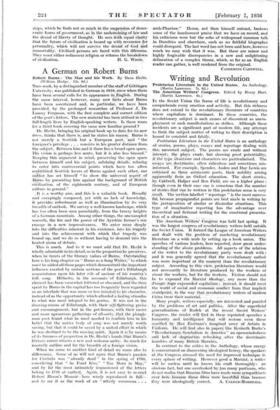Proletarian Literature in the United States. An Anthology.
Writing and Revolution
(Martin Lawrence. 7s. 6d.)
The American Writers' Congress. Edited by Henry Hart. (Martin Lawrence. 6s.) IN the Soviet Union the frame of life is revolutionary and comprehends every emotion and activity. But this richness does not extend to the revolutionary literature of countries where capitalism is dominant. In these countries, the revolutionary subject is such causes of discontent as unem- ployment or such manifestations as strikes. Although these incidents are a significant part of modern life, any attempt to ,limit the subject matter of writing to their description is bound to constrict and-falsify.
Proletarian Literature in the United Stales is an anthology of -stories, poems, plays, essays and reportage dealing with .this nurrewed‘subject. The poems are crude and without interest; the plays crude, but showing great potentiality, if the type situations and characters are particularised. The essays, are,,, doctrinaire, often ridiculous and sometimes mis- informed. :For:example, Spender, Auden and Day Lewis are criticised as2three aristocratic poets, their nobility arising .appaientlY. ftoin an thlfOrd education. The short stories, Caldwell,;: Hater and Ben Field, are on a higher plane : though even -in their case one is conscious that the number of 'stories that-can be written in this proletarian sense is very The section labelled " reportage " is the most success- ful, :herause propagnndist are best made in writing by the juxtaposition of similar or dissimilar situations. This type of imaginative reporting has the advantage over theoretical and fictional writing for the emotional presenta- tion of a situation.. , „. L.. The :American Writers'., Congress' was held last spring. It was the largest congressof revolutiorfary writers held outside the SnYiet Unioii. ' It forine-d theLeague of American Writers and dealt with. 'the ;problem of marketing revolutionary literature on a wide scale by setting _up a book union. The speeches of various leaders, here reported, show great under- standing of the above,. problems. MI aspects of the relation of the writer to the revolutionary. party were dealt with : and it was generally agreed that the revolutionary outlook was more imPOttant at the -moment than the revolutionary subject. - ACcording to this view, proletarian literature would ,not necessarily "be literature produced by the workers or about the workers, but fat the Workers. Fiction should not be to expound the Marxist ideology, any more than the ...i"Orgfe,SOga expounded capitalism:; „instead, it should treat the world of social and economic-conflict from that implicit standp-o0; in, the way that-Leyolutionary writers of modern China treat their material:- -- Many people, writers-especially, are-interested-and-puzzled by the problems _off art and politics.: After the-superficial generalisations of Radek'- at "the recent Soviet Writers' Congress, the render .wf4 Ind 'in these reprinted 'speeches a humanity and. intelligence /hat , will restore even those sea;ified ,Max Eastman's ,imagined army of Artists in l'urEcPrfr. `: He will. find -also in paperl„ like Keiiheth Burke Revolutionary, Symbolism in America" an openmindedness and - dogniatir4M --iefreShing t after the doctrinaire inanities of many liritishr MurxiSts., I • • In contrast to the critics in the Anthology, whose energy is 'Concentrated on discovering ideological heresy; the-speakers -at the Congress stressed the need for improved technique in every sphere of writing. However good a Marxist, a writer will be useless until he knows his craft thoroughly : an obvious fact, but one overlooked by too many partisans, who do not realise that Russian films have made more sympathisers over here illriii---Nyzere: beautiful than because they were ideologically correct. A. CALDER-MARSHALL.














































 Previous page
Previous page